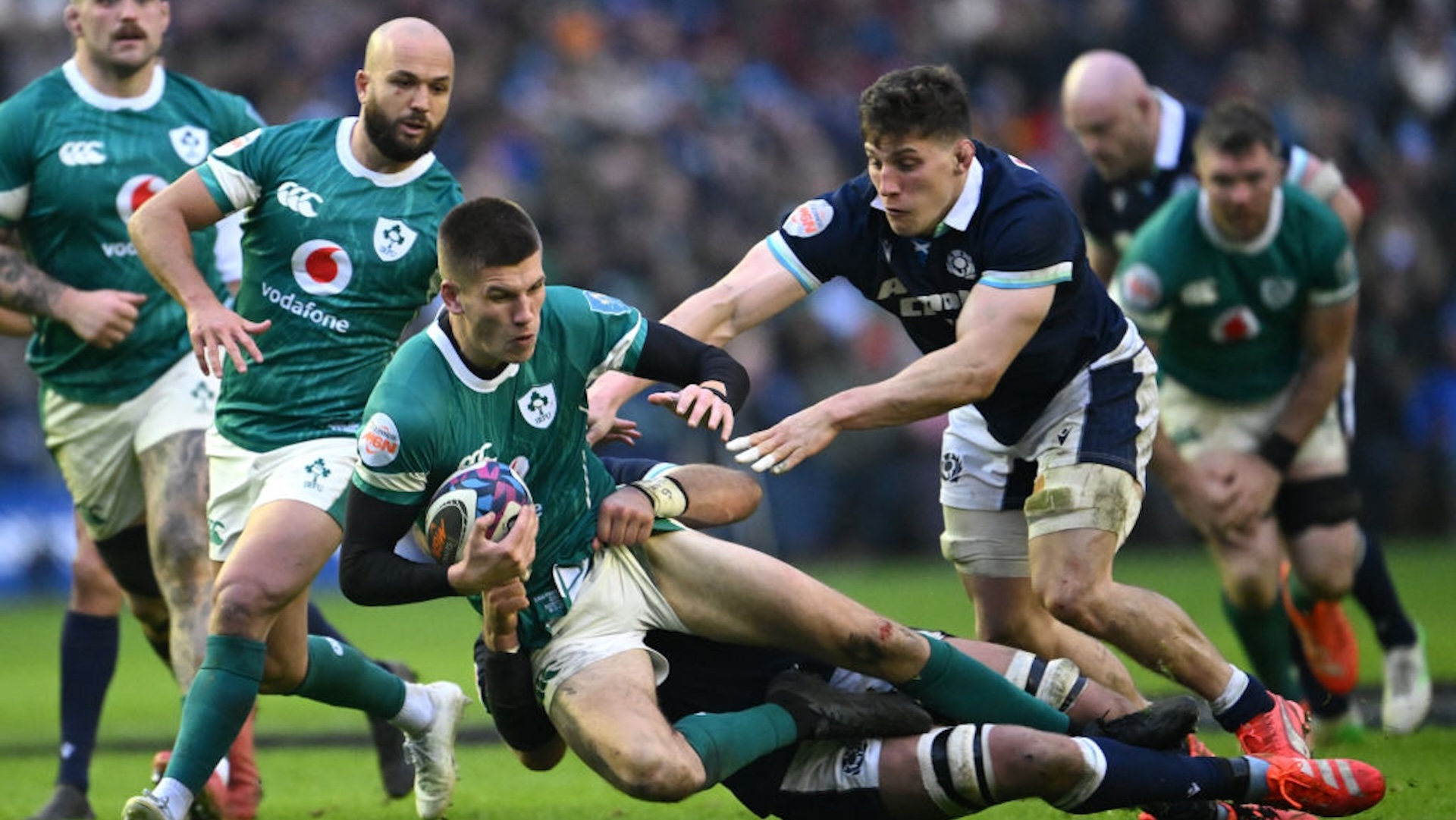Ireland came out strong and finished stronger while defeating Scotland, 32-18, in a Six Nations rugby tilt Sunday evening in Edinburgh. Ireland, the tournament's two-time defending champs, came out of the weekend as the only remaining undefeated side after only two rounds.
Ireland struggled to get going last week in Dublin in its Six Nations opener before blitzing England with 22 unanswered points to put the match away in the second half. There was no such slow start against the Scots.
Ireland drew first blood at just the seven-minute mark with a score from Calvin Nash, who took a pass wide from Sam Prendergast across the try line for a score. Prendergast, who came into the match amid much debate over his wearing the esteemed No. 10 jersey but by the end of the day had kicked all such talk to the curb, put the conversion through the skinny poles and his side was up, 7-0. Scotland was lucky to not be down by a much bigger margin by then, having twice forced turnovers by keeping Ireland from touching the ball down after crossing the line.
But things turned real ugly for the hosts at the 21-minute mark, with Scotland already down a man from a yellow card. Two of the home side’s most important players, fly-half Finn Russell and winger Darcy Graham, took each other out with a brutal upper-body collision while attempting a tackle of Ireland stalwart Jamison Gibson-Park. Replays showed Russell and Graham’s heads slamming into each other in the violent encounter, and both players had extended stays on the turf. Russell walked away from the Scot-on-Scot violence wobbly but under his own power, but Graham needed to be stretchered off in a neck brace. Neither player returned.
A penalty conversion from Prendergast made it 10-0. The Irish were up 17-0 on a try by their captain, Caelan Doris, on a pass from Gibson-Park, man of the match in last weekend’s rout of the English.
Scotland didn’t get themselves on the board until just before the break. Duhan van der Merwe took a nifty left-handed scoop pass and dove over the line for a dramatic Scottish score in extra time of the first half. The conversion made it 17-5, close enough so the Murrayfield Stadium fans could convince themselves the Irish were still within striking distance with a whole half to go. Then the clash of the Celtic clans got even closer as Scotland converted two penalties after coming out for the second stanza to tighten the score, 17-11.
But Ireland responded with tries from both James Lowe, a hero from last week’s match, in the 53rd minute and Jack Conan only five minutes later. Another penalty conversion from Prendergast made it 32-11, and victory for the obviously superior Irish side was assured. Ireland has now won 11 straight matches over Scotland.
There’s still lots of tush pushes to be had before this year's Six Nations tournament wraps up. But after dispatching England and now Scotland, who along with France were seen by pundits as the top contenders to displace Ireland and win this year’s title, the reigning champs now sit alone atop the table with three matches left.
Teams are given four points for a win and two for a draw. Bonus points are given for losing by fewer than seven points, or scoring at least four tries in a match. Ireland are already up four points on the rest of the field, and have what on paper should be a cakewalk in their next match, against winless and woeful Wales on Feb. 22 in Cardiff. Italy isn’t thought of as able to contend with Ireland this year, either.
No team has ever won three consecutive outright Six Nations championships, in a competition that began in 1883 as the Home Nations Tournament with just four teams (England, Scotland, Ireland and Wales). Whether the Irish will end that amazing streak could come down to a March 8 matchup with France in Dublin.
The French came into the tournament as the likeliest side to depose Ireland in this year’s Six Nations title. But on Saturday in London, the English did the Irish a huge solid. The English upset France by a single point in what was as thrilling a contest as can be imagined. England seemed to have a talent deficit compared to the visitors in blue, but ultimately made up for that with an equally apparent courage surplus. With the match in its 80th and last minute and England down six, Elliot Daly took a toss from fly-half Fin Smith over the line to bring the underdog hosts within a point. Smith’s two-point conversion with the outcome in the balance was true, so the final whistle blew with England on top, but barely: 26-25. Not that beating France in a rugby match makes up for, say, the famine, centuries of oppression, Bloody Sunday, and stealing six counties, to name but a few English atrocities. But a solid nonetheless.
France earned only a single bonus point in the loss, because of the small margin of its defeat. After the second weekend, both France and England now trail Ireland by four points in the Six Nations table.
Not to get too far ahead of ourselves, but: There is really only one possible ugly plot twist left. England, in what was a humiliating, one-sided defeat versus Ireland, earned a bonus point by scoring its fourth try at the very end of the match. If the French somehow beat the Irish convincingly and also prevent them from getting the bonus point for tries, there’s a chance that that worthless-seeming-at-the-time bonus point England got in garbage time of last week's loss to Ireland ends up foiling Ireland's preeminence on the final Six Nations table, and takes away their shot at the threepeat and rugby immortality.
God, no. Just no.






